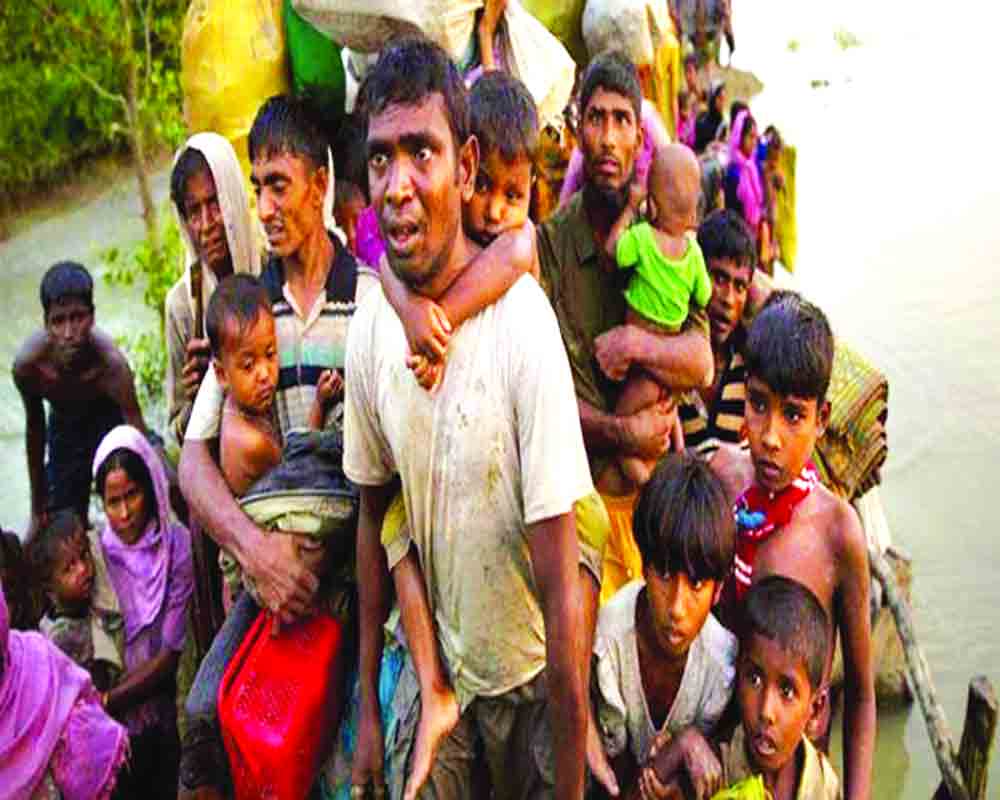Illegal migrations can lead to social and political tensions in the host country which can be a real problem in the long run
The current times are not merely of wars and armed conflicts, but also of infiltration. Britain hosts illegal immigrants, which costs the country 8 million pounds a day merely to feed them. Due to a clash between Burma’s rebels and the country’s army, reportedly at least 50,000 if not a lakh Burmese have entered India and have penetrated up to Manipur and Mizoram, some up to as far as Delhi. One estimate says there are up to 175,000 illegal immigrants in the UK.
Ukrainians by the thousands have rushed into Poland over the last year and a half, while many others are knocking on Germany’s doors. Being of European stock, they are not unwelcome, whereas the immigrants entering the UK are from Rwanda, and are positively unwanted. A third category of potential migrants are ready to flee the West Bank and the Gaza Strip in Israel and Hamas, but they are scrupulously unwanted by even the most zealous Islamic countries.
Europe, over the last decade or more, has been talked about as possibly becoming ‘Eurabia’ shortly. Yet, when many Syrians were fleeing their own country to escape bombing by their regime, several member countries of the European Union led by Germany, and then Chancellor Angela Merkel were ready to welcome them. Merkel might have perhaps been moved to sympathy by her own experience as an East German whose government killed thousands of its citizens for wanting to flee to the West.
India has suffered illegal immigrants from Bangladesh to the tune of some 20 million of the latter’s citizens living illegally in India. As if this was not troubling enough, Pakistan has lately become sick with impending bankruptcy. It is reported that its not so well-off citizens survive on one meal a day. When even that meal disappears, would they not be tempted to dash the Indian border? The citizens of Pak-occupied Kashmir feel oppressed, and some of them feel that it is their right to become Indian citizens because their Maharaja (Hari Singh, the erstwhile princely ruler of Jammu & Kashmir) had acceded to India in 1947. It was the Pakistani Mujahideen who had occupied their territory forcibly. There is no counter-answer to this claim.
Books have been written on migration, some of which contend that most peoples of the world have migrated from somewhere at some stage of history. One notable book is Migrants by Sam Miller. India certainly attracted waves of migration over the centuries due to its prosperity compared with Central Asia. However, that does not justify further illegal entry into India.
An almost uninterrupted flow of migration into the European Union has been changing Europe’s domestic politics since the last decade or even more. Today, Europe, and particularly Southern Europe is exposed and vulnerable to pressure to migration from the Middle East and North Africa, a region referred to as MENA.
Unlike the Republican Party and its leader Donald Trump, not everyone in the USA objects to migration from Cuba or Mexico. The reason may be that they are predominantly white. Nationality is often defined as those people whose hearts can beat together. On the other hand, there are US citizens who realize that allowing migration from any sundry country with varying racial stock will lead to conflict. Consequently, there is a growing reluctance to further immigration. But again, there is a divide between the Republicans and the Democrats, the latter generally favouring immigration as an addition to their votebanks.
The United Kingdom, in the aftermath of World War II, allowed free immigration from their Asian colonies as well as their Caribbean ones. In recent years they have begun to regret what their predecessors did in response to their temptation to procure cheaper labour. The French experience has been bitterer because up to ten per cent of the immigrants into the country are Algerians whose hearts beat often in contradiction to those of the European French.
The Netherlands and Belgium are also inconvenienced by immigrants of a similar kind, while Germany has a large number of people from Turkey, who are not welcome. Although they have been called guest workers, the truth is that once an outsider settles in a host country for a few months, it is virtually impossible to make him or her quit. Canada and Australia have virtually limitless space, and to expand their economies, have liberal policies on immigration. What the cost of building multiracial or multicultural societies will be, only time will tell.
A political scientist would take a political view that in due course, two or three communities in the same country can lead to not only social tension but also political competition. The current clash in West Asia is not the only example. The Indian experience of 75 years ago led to a partition, whereby 35 per cent of the land area became another country. Years ago, Nigeria fought a bitter civil war between the North Muslims and Southern Biafra Christians. The Christian East Timor separated from the rest of Islamic Indonesia because of a clash of cultures. Those dealing with migrants should bear these undeniable aspects of history in mind before framing policies.
(The writer is a well-known columnist, an author and a former member of the Rajya Sabha. The views expressed are personal)
























